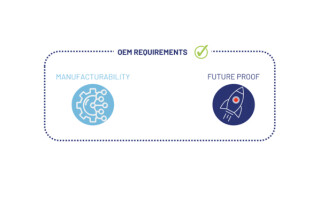Engineering Hero: Bringing Prosthetic Arms to Life
December 28, 2023
Sponsored Story

Welcome to the eighth installment of Engineering Heroes, sponsored by Wind River, where we take a closer look at the lives of unsung heroes in the world of engineering whose work impacts uncountable lives across the globe. See the bottom of the article for additional content on Albert Manero and our other heroes.
Albert Manero’s nonprofit, Limbitless Solutions, started at a kitchen table. We’ve all heard stories of industry giants like Apple and its unassuming beginnings in a garage. But Limbitless Solutions isn’t just about technology — Manero and his team build bionic prosthetic arms, custom-designed specifically to fit children with limb differences.
Now, building bionic prosthetics was not something Manero necessarily foresaw as his life’s calling during his education at the University of Central Florida. His entire academic background, through his PhD, revolved around aerospace and mechanical engineering. He even spent some time working on things like jet engine blade coatings at the German Aerospace Institute. Life has other plans sometimes, though.
One day when he was in his car, he turned on the radio and heard an interview about people building mechanical hands using 3D-printed parts that snapped together. He knew immediately that he wanted to find a way to be involved in that, so he contacted the people running the project and asked how he could help, offering both his software and his time.
About a year after that, he was contacted by a family that had found his email address on an associated website, and they asked him if he could build their son a bionic arm. He said yes, of course, and then made some calls himself to friends and colleagues who banded together to figure out exactly how they could make it happen. And thus, Limbitless Solutions was born.
Manero and his team created the first iteration of their CAD, which resulted in “an unfinished, kind of incomplete, unpainted arm,” he said. But the arm worked, and when it was given to the boy whose family had requested it, "Alex hugged his parents with both arms, and everyone cried."
Since its kitchen table beginnings in 2014, Limbitless Solutions has transformed into a full research facility based at UCF. Alongside Manero is the nonprofit’s other co-founder and director of technology, John Sparkman; a team of 50 undergraduate student research interns in fields ranging from art and game design to pre-med or PR, and everything in between; and other full-time team members and affiliated UCF faculty members that help with outreach, web/application development, video game training, and more.
“On the functionality side, they leverage a very compact in-house developed electromyographically actuated multi-gesture hand. So, we do the electronics, we do the shell of the arm, we do the cosmetic of the arm, and then we even do the gamify training. And that's where our partnerships with the game design professors come in — to be able to do simulation and training [for the arms] using video games.”
Most of the bionic arms available on the market today are expensive — around $40,000, accorrding to Manero — and difficult to acquire. Additionally, there's not a lot of size differentiating, meaning arms can often be too heavy for children to wield effectively. And those accessibillity factors have been a big part of what Manero, Sparkman, and the rest of the team have wanted to address with Limbitless Solutions.
Through the course of Limbitless Solutions’ lifespan to date, the nonprofit has set forth some pretty big goals, like getting their prosthetics cleared by the FDA to be offered as prescriptions to children who need them, whose families may not have the resources to pay that traditional $40,000 sum for a bionic arm. But for now, they’re working on expanding their offerings to not just children, but adults as well.
Editor's Note: For more Engineering Hero content, check out the links below.
Daire McNamara, Director and Firmware Engineer, Emdalo Technologies:
Nandini Kappiah, Senior Director of Software Engineering, Google:
Valentyn Hlukhotskyy, Senior Java Software Engineer, Euristiq:
Levi Zima, RF Microwave Engineer:
Samer Mabrouk, Postdoctoral Research Fellow, Georgia Institute of Technology:
Anton Riström, Department Manager, Aker Solutions:
Dr. Karisa Schreck, Assistant Professor of neurology, oncology, and neurosurgery & Co-Director of BRAF Brain Tumor Center, Johns Hopkins:
Albert Manero, Co-Founder, Limbitless Solutions:




